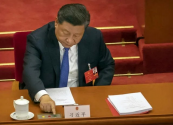You are using an out of date browser. It may not display this or other websites correctly.
You should upgrade or use an alternative browser.
You should upgrade or use an alternative browser.
Chinese Economics Thread
- Thread starter Norfolk
- Start date
Edit: lol article is from 2016. I got trolled by Twitter
Something extremely big is coming
Let's go. Press the button and leave the old economic model behind.
Time for a transition
Let's go. Press the button and leave the old economic model behind.
Time for a transition
In a sign of distaste for the credit-pumped growth in the past couple of months, the Communist Party mouthpiece [People's Daily] cited an unidentified “authoritative” figure as saying that boosting growth by increasing leverage was like “growing a tree in the air” and that a high leverage ratio could lead to a financial crisis.
Economic growth was set to enter a so-called L-shaped trajectory for a few years and it was unrealistic to expect any rebound in the world’s second largest economy, according to the article.
The unnamed figure, Fenby said, “must come from the party’s leading group on economic and financial affairs, and my guess is it was Liu He or any of those who are close to [President] Xi Jinping”.
The article, in the form of a question and answer format, repudiated many of the economic policies pursued by the State Council under Premier Li Keqiang, including propping up stock prices to address a slowdown in growth and boost the leverage ratio to keep expansion on track.
Last edited:
I got trolled by Twitter and I went to a 2016 article lol. Unfortunately we will have to wait a little longer for the red button to be pressedView attachment 79113
View attachment 79114
XJP now feels China is ready to launch the Full Communism and Common Prosperity button.
“Now, very often, manufacturers don’t have the margins to give discounts, so we’re going to China simply to have product,” said Charlie Birnbaum, COO of Pish Posh Baby. “We’re not saving money and we’re doing it more often.”
From McKinsey Insights: The rise and rise of the global balance sheet: How productively are we using our wealth?
The question is global wealth is tied to a large extent to real estate, but is real estate driving productivity and social mobility sufficiently?
The question is global wealth is tied to a large extent to real estate, but is real estate driving productivity and social mobility sufficiently?
Therein lies the tales of two systems.
Per Western doctrine of corporate governance, as famously described in corporate finance theory, it is the shares-holders, aka capital, that decide, or should ultimately decide what is a good economic activity to pursue for any corporations. Any corporate management that makes economic decisions that align with share-holders' interests is deemed to be under a good corporate governance, if not, under a bad one. Any corporation that takes share-holders out of the decision loop is deemed to be in breach of corporate governance. What is the share holders' interest one might ask, and it is the profit. So share holders, aka capital, wants only one thing, ie, the profit, and they got to have a say in every decision making in how to make that profit. In other words, everybody is accountable and answers to money, and it's called good governance. All the rage in the latest fads are green finance, social impact, impact investing, social entrepreneurship, etc, but they all the same in essence, same dance to the same song but with a different arrangement.
Current Chinese hybrid system mostly self finances its economic activities, these foreign investors/shareholders/capital don't have a say in what China does with her own money, and they don't like it a bit. That's the reason MSM business articles are abound with China collapse, with their own narrow corporate governance point of view. China has been building up her own financial capital, human capital and last but not least physical capital at an impressive clip that they feel they cannot maintain the lead by usual means of these finely couched, academically certified, MBA stamped BS doctrine of "for money, by money, nothing but money" governance. China would only allow foreign capital in much need technology and high end service sector in order to spur domestic competition and growth. Chinese system only allow capital as an engine, a horse, an ox, but not as a driver, or a decision marker. It's a means to an end. US$1 T worth China's tech shares wiped out in short succession don't mean much for Chinese system. It was only book value. Investors spooked? Never high up in the decision matrix. Like in the current pandemics precedent, it's the common Chinese people who's the ultimate goal that money must serve, not money itself. As China grows ever more, it's the foreign investors, if and when they bring in what China wants, who need China more. Not the other way around.
Western capitalist preaching finance to Chinese Communists is like a high school drop out teaching a seasoned Wall Street banker how money works.
This author, citing many analysts, advocates the depreciation of yuan against dollar, also called Plaza Accord 2.0, for the Chinese and American economies to re-couple instead of decoupling. And, very sexily, he suggests that this is actually in the interest of China. Of course, any positive effect on the relieving inflation pressure that US is desperately in need of is purely secondary.


